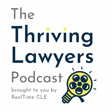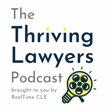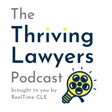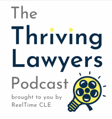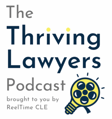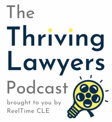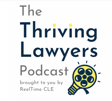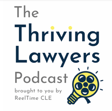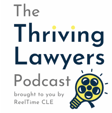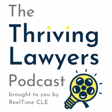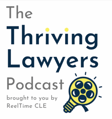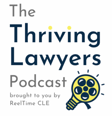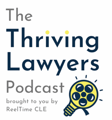Become a Creator today!Start creating today - Share your story with the world!
Start for free
00:00:00
00:00:01

Prof. Shailini George, who IS The Law Student’s Guide to Doing Well & Being Well
In this week's episode, join Michael Kahn for part 1 of an enlightening and hopeful interview with Shailini Jandial George, Professor of Legal Writing at Suffolk University Law School. Stay in Shailini George's loop >> https://www.suffolk.edu/academics/faculty/s/j/sjgeorge Twitter: @ShailiniG Instagram: lawyer_wellbeing
Transcript
Task Shifting vs. Multitasking
00:00:00
Speaker
It is task shifting. We all think it's multitasking, but you know, if you're working on a brief or studying for an exam or, you know, writing, you know, doing some research at your law firm and you constantly check your email or get a ping on your phone, that draws your attention away from the work that you were in. So you're not doing those two things at the same time. You're breaking your attention.
00:00:23
Speaker
shifting to something else. And then when you try to go back to the task that required your deep focus, you've lost time and you have to spend some mental energy getting back to that point where you were deeply engaged.
Introduction of Hosts and Guests
00:00:36
Speaker
Welcome back to The Thriving Lawyers Podcast. In this week's episode, join Michael Kahn for an enlightening and hopeful interview with Shalini George, a professor of legal writing at Suffolk University Law School.
00:00:49
Speaker
Welcome back to the Thriving Lawyers Podcast. This is Michael Kahn, one half of real-time creative learning experiences. My partner is Chris Osborne. He is a practicing lawyer. I am a former lawyer and currently a licensed professional counselor. And I do a couple days a week of counseling for the Lawyer Assistance Program in Vancouver, BC, where I am currently situated. We have
00:01:19
Speaker
A wonderful guest today, Shalini George. She is a professor at Suffolk University, a law professor, professor of legal writing. And in fact, I found out about Shalini when I'm a podcast junkie. I heard her on a podcast. And I, after that, bought her book. Shalini, I think I did tell you I bought your book. That's good to know. And it's always good to know that somebody's listening to those podcasts.
00:01:47
Speaker
Right? I know. Well, it was a great interview. It got me interested enough to buy your book, and I've been reading your book and haven't read the whole thing yet, but it's really helpful. But let me just give a quick two-sentence biography about Shalini, and then I'll let her add on to that.
Focus Areas of Shalini George
00:02:08
Speaker
She is a legal writing professor at Suffolk University.
00:02:15
Speaker
And her scholarship focuses in the areas of lawyer well-being, mindfulness, and the cognitive science of learning. She's the author of, this is a book that I'm reading right now, The Law Students Guide to Doing Well and Being Well.
00:02:31
Speaker
And even though it says law students, the information in there is applicable to lawyers, not just those who are in law schools. So that is why I bought the book. I knew it was going to be applicable to my work with lawyers. And she's also the co-author of Mindful Lawyering, The Key to Creative Problem Solving. And Law Review articles on distraction and the cognitive science of learning and why law students
00:02:59
Speaker
need mindfulness training. And finally, and lastly, this is important, she also was recently appointed to the Institute for Wellbeing and Law's Research and Scholarship Committee. I've done some work with the Institute for Wellbeing and Law, and they are really doing some excellent work around the area of wellbeing for lawyers and thriving for lawyers. So, Shalini, how did I do with that? Do you want to add some things to your bio?
Shalini's Role in Legal Education
00:03:29
Speaker
Well, that was great, Michael. And let me just first of all thank you for having me here today to talk about a topic that I know we both care very deeply about. And it's always great to have a place to talk through some of these issues. You did a great job with my bio. I'll add just a couple of things. I was recently named to the executive committee of the double ALS balance and well-being and legal education section.
00:03:55
Speaker
So that's law professors, you know, a section of law professors, all of whom are interested in looking for balance and well-being in legal education. And I'm doing a lot of work at Suffolk on these issues too, which I'm sure we're going to talk about. And just as an aside,
00:04:11
Speaker
I think the book, my book could be titled Anyone's Guide to Doing Well and Being Well. Not just lawyers or law students. Not just lawyers. There was a joke in my family as I was writing it that there were different editions that were going to come out. I have two boys in college and I thought I could do the college students guide to doing well and being well.
00:04:32
Speaker
But I do have an academic book publisher and they wanted to make sure that the audience knew that I was a law professor. But anyway, thank you for that great introduction and I really look forward to talking more today about the topic of thriving. Yeah, thank you.
Advocacy for Well-being in Law
00:04:50
Speaker
And just for our listeners, and actually for me too, AALS, what does that stand for? That is the American Association of Law Schools.
00:05:00
Speaker
And that is an organization of thousands of law professors across the country and literally thousands. I wish I knew off the top of my head how many, but it is the primary way that law professors around the country organize. And we have a yearly conference in January, but it's divided. The membership is divided into sections based on topics. So for example, there's a legal writing and reasoning section.
00:05:25
Speaker
There is a teaching method section, a contract law, animal law, you name it. But one of the newer sections is the section called balance and well-being in legal education. So that is a place where I find like-minded professors, all of whom are really working on ways that we can bring elements of well-being and balance into the law school so that we hopefully set students up for better chance of
00:05:53
Speaker
of thriving and maintaining their legal careers. Yeah. I mean, starting in law school would be ideal, wouldn't it? Because to some of the folks that I see in my counseling, in my lawyer assistance counseling, are folks who have bad habits to break. Right. And starting in law school with good habits would be helpful, wouldn't it?
00:06:20
Speaker
Yeah, absolutely.
Dimensions of Lawyer Well-being
00:06:22
Speaker
You know, whenever I give a talk about my book, or in this, I am teaching a class at Suffolk that I'd love to talk about a little bit too. But, you know, I take the lawyer well being graphic, you know, the dimensions of lawyer well being, and I try to have a conversation with students about the fact that for a long time, nobody talked about any of the dimensions other than how many hours do you work?
00:06:48
Speaker
And I tell them I know none of you have come to law school hoping to be burnt out and unhappy You know with mental health issues one day nobody nobody strives for that and yet that's what's happening to a lot of us So just even if I can't even we can't necessarily create healthy habits But even a discussion about why we should have healthy habits is a step. I think in the right direction I agree and the graphic that you're mentioning was from the
00:07:18
Speaker
Wellbeing task force report right and for those of you who who haven't seen it it defines lawyer well-being as a Quote continuous process in which lawyers strive for thriving in each dimension of their lives and it lists six different dimensions emotional physical social spiritual intellectual and occupational
00:07:45
Speaker
And Shalini, as we discussed in email, I guess yesterday, the Oregon Attorney Assistance Program, as far as I know, they, I think they're the first ones who did that, adding cultural wellbeing to the list of dimensions, what I think was a good ad. Yeah, I agree, I agree.
00:08:15
Speaker
And so it's a really helpful idea and graphic that there are these various dimensions because it's a recognition that we're not automatons who go to work and bill 12 or 14 hours and have nothing else that we need to think about. It is giving, I think, permission for law students and lawyers to understand that there are other aspects of our beings that if we attend to, we can actually perform, I would argue, perform better.
00:08:43
Speaker
and more productively, and that that's why we should be thinking about nurturing and really understanding the other dimensions as well.
Shalini's Personal Journey
00:08:54
Speaker
So let's just talk and come back to some of this, but Shalini, why don't you share your journey to becoming a lawyer and then eventually becoming a law professor
00:09:11
Speaker
And then I might interrupt at times as you're sharing this if I have a specific question. Sure. So I could go on and on, but I'm going to try and give you just the highlights. As I was growing up, so Michael and I talked about this before we started our recording today. I am the children of immigrants.
00:09:36
Speaker
My parents came here from India. My father came to get his master's in engineering at a time when the United States was very eagerly welcoming doctors and engineers from Asia. As I was growing up, I was generally given two options. I could choose to be a doctor or I could choose to be an engineer. Unfortunately, I was not terribly good at math or science.
00:10:02
Speaker
I shouldn't say that I was all right at them. I just didn't love it. I found myself very interested in the law. And so when I made the suggestion that maybe law school would be an option, you know, my parents, I think were very excited to see me excited about it. So I went to law school straight from undergrad, which I don't really recommend to people, but that's what I did.
00:10:25
Speaker
And my interest in law was always in litigation. And so that's what I pursued from the very beginning in law school interning and clerking for the Superior Court in Massachusetts. And then I worked for a small plaintiff's employment litigation firm.
00:10:43
Speaker
Actually, I clerked for the Superior Court for a year. I did some plaintiff's work for about two years, and then I worked at an insurance defense firm for seven years, so really heavily in litigation, discovery, deposition, summary judgment motions, and trials. So in total, I worked for about 10 or 11 years. I had an aha moment, though, at one point where my father passed away when I was on maternity leave with my second child.
00:11:13
Speaker
And I had a little bit of time to kind of stop and take a breath and think about whether I was actually doing things that I enjoyed doing that made me happy. I had had an enlightening conversation with my father before he passed away, in which he reminded me that I had always really liked teaching. And so I started thinking about kind of combining my interest in law with teaching.
00:11:39
Speaker
And it took me about a year, a year and a half, but I found this position at Suffolk and teaching legal writing because I thought that's something I was qualified to do. And I have been there ever since. And Shalini, can you hear me right now? I can. OK, good. I was having just a momentary issue with my microphone. OK, I hear you fine. OK, great.
00:12:06
Speaker
So your dad, sorry, I was a touch distracted with the microphone for a second, but your dad passed, did you say it was 20 years ago? Yeah, yes. I had just had my younger son who's going to be 20 in July, so it's coming up on 20 years in September. He had not been well for a few years, so it was not
00:12:30
Speaker
surprise at the time, but it was difficult to had a two-year-old and an infant when he passed. So my firm was asking me all the time, when was I coming back to work? I was told by another female partner that she only took six weeks off from maternity leave and she wasn't telling me that I should only take six weeks off, but when did I think I would be coming back to work? So that really helped me, I think,
00:12:59
Speaker
realize that I was not dying to get back to work and that there were some things that I had not been enjoying tremendously and It was an opportunity for me to take a little bit of a course correction Yeah, yeah. Yeah, that's interesting that you you said that certainly And we talked a little bit before the interview today that Loss is something that that that we all experience and it can have
Challenges in Legal Profession
00:13:30
Speaker
and affect, it can affect us all differently. And I do a lot of work with grief and loss in my work now as a counselor for lab and also when I was in private practice, but it sounds like it certainly understandably had an impact on you and on your path. It absolutely did. And it's something really, I still think about sometimes when I'm working with young law students,
00:13:57
Speaker
you know, there are some difficult things that happen when you work in the world of billable hours. And so it was hard for me to manage, you know, two young children, my father not being well, you know, maternity leave that coincides with bereavement leave, which means I didn't really get one or the other fully. And it's like, but you still have to bill. So, you know, those are some of the hard, cold hard facts, I think, for a lot of lawyers. And I think, you know, hopefully culturally,
00:14:27
Speaker
The way that law is practiced needs to change a little bit because that sort of framework does not allow for those other dimensions of well-being that we were talking about just a few minutes ago. Yeah, and you also gave an example of the culture of some law firms. A lot of law firms, unfortunately, was the not so subtle message that you wanted back at work quickly.
00:14:56
Speaker
Right. Here in Canada, gosh, I think each parent can have six months leave after they have a child. We have friends who are a couple here just had a baby and the mom took six months off and then she went back to work and the dad now is taking six months off. Well, I think where the United States is one of the
00:15:20
Speaker
one of the countries in the world with the worst parental leave policies. We could obviously talk a whole hour about that. But it poses challenges obviously for young attorneys and particularly for young female attorneys because the bulk of things still fall on them no matter how much things change. Right.
00:15:46
Speaker
touch on that in our discussions before this. The practicing law, going to law school, being a law student, that's all stressful and it's even more stressful for law students, for lawyers who are in marginalized groups. People of color, women,
00:16:10
Speaker
As an example sexual orientation, although it's not as obvious a modernization Certainly that can impact people's experiences and law school and law firms and ultimately well-being Did you want to speak to that at all? Yeah, sure I mean, I don't know that there's anything more critical actually to somebody being able to fulfill their full potential than
00:16:38
Speaker
being your full self in any particular role. So when I went to law school, and I'll give away my age here, in the early 90s, there were not a lot of Indian lawyers. There were certainly not a lot of Indian law students. I had people say things to me in interviews like,
00:16:59
Speaker
Oh, you seem really great, but I just wonder how people will react if we bring somebody like you in for a second interview. And I never knew if that was because I was a woman, because I was a person of color, like what really was the issue? Or both. Yeah, or both. I had people say, I'll never forget somebody who asked me, how'd you get to be a lawyer? Aren't your people usually doctors and engineers?
00:17:27
Speaker
And now we have maybe an understanding that when you say something like your people, you're really saying you're not one of our people. That's right. So I'm glad to know that things are changing and that we're having these conversations and that there is a recognition. Certainly the ABA is explicitly recognizing the importance
00:17:48
Speaker
of information training, education on cross-cultural competency and on racism. So these are all positive steps. They don't happen overnight. And I don't know that anybody has the magical answer as to, you know, you can't wave a wand and make everybody culturally competent.
Mindfulness in Law Practice
00:18:07
Speaker
But again, I think just having the conversations and this recognition that it is something for us to talk about is a really positive first step.
00:18:17
Speaker
I mean, self-awareness certainly helps. And that's where, to me, and we're going off in lots of different directions here, but that's okay. You talk about mindfulness in your book and what an important tool and resource that is and way of life, really. And mindfulness is one of the best tools to become more aware of how you are with
00:18:46
Speaker
people in general, but particularly people who are different than you. Right. And how your behaviors, your thoughts, your reactions to folks who are different than you, right? Right. I mean, you know, I think the power of mindfulness, at least the way that I practice and explain it to my students, is in slowing down.
00:19:09
Speaker
taking a moment to be intentional and conscious, very consciously make choices about our language or how we react to people or situations. And there can be sometimes hesitation that mindfulness is some sort of mystical or religious or something that doesn't belong in law school.
00:19:35
Speaker
But I would argue the exact opposite, that as lawyers who are supposed to be rational, logical thinkers, that it probably makes sense for us to give our brains a chance to kind of slow down and assess the situation, choose our words carefully, understand.
00:19:51
Speaker
maybe the background of a situation that we are dealing with so that we can better address these sorts of issues rather than leaving them unsaid. I think people tend to think if you don't talk about race or you don't talk about culture or you don't talk about pronouns that it just means that everybody's fine. And I think that's not true.
00:20:15
Speaker
So we used to, I used to hear people say things like, well, I don't see race or, you know, I think of you as just being like everybody else, but nobody's just like everybody else. And so when we say that we're ignoring, um, a whole part of, of who we are. Um, that's why I'm not seeing, go ahead, finish. No, I was just going to say, that's why I think the, the inclusion of the cultural wellbeing as a dimension is an explicit recognition.
00:20:42
Speaker
There is that this part of us it be it. It's not always about Your your color necessarily, but you know your culture what you eat What you enjoy listening to where you spend your time? All of that is wrapped into who we are as people Yeah, and back to the idea of being colorblind or gender blind right that's
00:21:10
Speaker
That means if you, first of all, it's impossible. Right, it's nonsense. But second of all, if you do strive for that, then you're not paying attention to the racism or the sexism that's going on. If you're not paying attention to race or gender, then you're also being
00:21:34
Speaker
You're you're you're blind to some some of the racism and sexism that's going right and other reasons Right, right. You're pretending that they don't exist and not acknowledge them does not mean they don't exist Right. So let's go. Let's talk just a little bit more about law school even though even though it gives me the shivers to Think about no truly I'm joking. I actually enjoyed law school. I know that's I
00:22:00
Speaker
Maybe it's kind of crazy for some folks to think I'm not thinking clearly to say that, but I did enjoy law school. I enjoyed the intellectual stimulation and actually had a blast. I met some wonderful people. It was certainly hard, especially the first year.
00:22:22
Speaker
I'm not sure I'd want to do it again, but I did enjoy it. In fact, I enjoyed law school more than practicing law. Certainly, you've been a professor now for, I think you said 18 years, is that right? Yeah, yes. I don't know if you said it in our interview right now, but I know you told me earlier.
00:22:41
Speaker
Around that much. Yeah. Yeah. So what are you noticing? Are you noticing any difference in the law students that are coming in and how First and how they're coming in and how they're dealing with stress how they're managing stress And is there anything that the law school well Suffolk and Suffolk in particular but in general law schools and you doing differently
Teaching Mindfulness and Focus
00:23:10
Speaker
in your teaching approach? I know that's a big question. I ask you a lot of stuff there, so feel free to start whatever you want. There's a few different things that I'd like to talk about there. I first started researching the process of learning and distraction. About 10, 11 years ago,
00:23:32
Speaker
I had been teaching for six or seven years at that point, and I think that was around the advent of the iPhone. We really changed the way that we take in and process information.
00:23:46
Speaker
I started doing a little bit of research because I was constantly complaining about my students. I felt they were distracted. I thought they were on their laptops not doing what they were supposed to do in class. I felt like maybe they were more interested in their phones than they were in their work at times. But I felt a little bit like a curmudgeonly old law professor who just was making these statements. But I didn't really know if there was legitimately something for me to be
00:24:16
Speaker
concerned about. So the one of the law review articles that you mentioned earlier is called teaching the smartphone generation. And that law review article was my chance like the research for that was my chance to understand a little bit about the brain, how we take in information, how we process information, and what effect does distraction and multitasking have on those abilities. And it's not good. I think we all know multitasking is not good. I could drink a cup of coffee.
00:24:45
Speaker
while I talk to you, because drinking the cup of coffee doesn't require my attention, but I certainly can't do something else that requires my attention well while I'm trying to focus. You can't do it well. Yeah, exactly. No. You can do it. A lot of us try, but we're not going to perform our best when we do that. I think you said, by the way, I listened to one of your podcasts earlier, you called it task shifting.
00:25:10
Speaker
Yeah, it is task shifting. We all think it's multitasking, but if you're working on a brief or studying for an exam or doing some research at your law firm and you constantly check your email or get a ping on your phone, that draws your attention away from the work that you were in. So you're not doing those two things at the same time. You're breaking your attention, shifting to something else. And then when you try to go back to the
00:25:38
Speaker
task that required your deep focus, you've lost time and you have to spend some mental energy getting back to that point where you were deeply engaged and your brain was making these connections that you wanted it to make and you were kind of moving the information along. So yeah, we do a lot of task switching. I thought students were doing a lot of it. And so I wanted to work on that law review article to educate myself about what was happening and also to get some ideas about what we could do to change that.
00:26:08
Speaker
That's where the law review article on mindfulness came from. If I had identified a problem of distraction, I then wanted to think about what the solution was and the antidote to distraction is.
00:26:20
Speaker
is mindfulness. So if we're constantly multitasking, you know, I had this this strange idea, what happens if we monotask, you know, like what happens if you actually just do one thing at a time, and we're not used to it. And our brains don't want to do that. Our brains crave novelty, and we feed our brains novelty. So it takes well, it's so easy now, of course. Oh, yeah, everything at the tip of your fingers, right. And I know you in your book, you talked about
00:26:50
Speaker
And I told you that one of the issues that comes up with a lot of my clients is procrastination. Yes. And one of the things you recommend for folks who are either procrastinating or having trouble getting their work done, easily distracted, is to put their phone in another room. Yes. Literally. Remove it from their space. Yes. I think that's a good suggestion.
00:27:21
Speaker
It seems so simple and yet it's very powerful. So research does show that when you have your phone, and this is something, so you asked, I'll just wrap this back into your last question too. You asked about how I've changed things or what have I incorporated into teaching. And these are things I try to educate my students about, that just having a phone near you, whether you're looking at it or not, your attention is going to your phone.
00:27:46
Speaker
So students think if it's in their bag or it's turned off or it's face down, they're like, but I'm not looking at my phone.
00:27:52
Speaker
But but you keep thinking right? Oh, I'm not gonna look at my phone And so that's the second that you're not engaged as I tell them like with me who knows what you're gonna what what amazing and and You know fascinating thing. I'm about to tell you that's right and you're gonna miss it because you're thinking You know did my mom text me? So well, listen, I have that exact thing happen to me when I was questioning my microphone Is it working right? I missed what you said, right?
00:28:22
Speaker
And you were talking about the very personal thing about your dad. So definitely not ideal. Not ideal to miss anything that you said, but certainly not that portion of it. So that was a great example of me being not now I wasn't. But you didn't do it intentionally. Yeah, exactly. But it was a good example of being distracted, right? Well, yes, the effective distraction, for sure. And so these are ways in which I have, I think, started to change my teaching
00:28:51
Speaker
in my legal writing class for sure. And I actually create classes where students have to bring something in to work on and there's no technology, no phones, no laptops, nothing. And I walk them through a process that I write about in the book of creating the proper physical and mental space in order to be productive. So it's very strange for them, but they have to bring in a hard copy of something.
00:29:17
Speaker
Which is the first like shock So they have to bring in a hard copy and they're allowed to have that piece of paper and a writing utensil on their desk And I have them put everything else away. I love it literally nothing else that they can think about Wow, then I do a few minutes of guided meditative breathing with them so that we kind of calm ourselves and
00:29:38
Speaker
We identify. How do they react to that when the new students, when you have them, go perfect. Yeah, Michael, you'd be surprised. They love it. They beg me for more. They want to know, like, they want to do it more. The first few times I did it in class, maybe they're a couple of skeptics. But by the time, and usually we do 20 or 25 minutes of work.
00:30:03
Speaker
But the important the most important part of that process is the debrief when it's over and when I say so, you know What did you accomplish? They have accomplished like two hours what they thought would take them two hours They've done in 20 or 25 minutes. Well, that's the key, isn't it?
Success of Mindfulness Retreats
00:30:17
Speaker
That really will encourage them to do that more Yeah, or they're they will tell me they see things that they hadn't seen like I read this over before I thought I had edited it This is something I do quite often before a memo is due. They think it's in really good shape
00:30:33
Speaker
but then they find when they really are deeply focused, they find mistakes they hadn't seen, they find typos, they find a gap in their analysis. So that debrief is really valuable.
00:30:45
Speaker
And then I can explain to them why this process was so successful. And then the really funny key is I say, you know, you can do this on your own. You could really do this. But they begged me for more. So I think that tells you something. That's pretty cool. I'm sure you share that with your colleagues there about it. Have any of them implemented some of what you do?
00:31:11
Speaker
Yes, actually. So we have something that we call a writing retreat. We do it once a semester. And we get faculty support for it so that we can get some food and beverages and things like that. And we have students come for a two or three hour block of time. And it's the exact same thing. They have to bring whatever work they need to do, but we get them started. The first step, actually, I should go back and say,
00:31:39
Speaker
I usually have them set a goal for themselves for the work session. So in these writing retreats, and they bring in whatever it is they want to work on. And we have them write down their goal for the day. And I just talked very briefly about how much more likely we are to accomplish something if we do it with a goal or intention in mind. We do that thing where we clear off physically things that are competing for our attention. I lead them through the meditative breathing. They work. We work for about 50 to 55 minutes, and then they take a break.
00:32:08
Speaker
And we talk about that, the importance of that, too. You know, you have to take a break. Your brain can't focus for some unlimited amount of time. And we get the same feedback from these students. They want me to do it once a week. And I have to kind of say, you know,
00:32:23
Speaker
You can create these conditions on your own as well. So that's one way in which the broader community at the law school is involved. Some of the other professors who I teach with do exactly my type of exercise in class.
00:32:41
Speaker
Thanks for listening to this episode of the Thriving Lawyers Podcast. We love hearing from our loyal listeners, so please feel free to email us any questions, comments, suggested topics, or guest recommendations at the following address, feedback at thrivinglawyerspodcast.com.
00:32:56
Speaker
The Thriving Lawyers Podcast is brought to you by Real-Time Creative Learning Experiences, a national provider of continuing legal education and professional development programs that leave participants engaged, encouraged, and equipped to pursue meaningful and sustainable change in their practices, their lives, and the organizations they work in. And by Osborne Conflict Resolution, your experience guides through the uncharted terrain of business and family law disputes based out of Charlotte, North Carolina. Thanks for listening, and we'll see you next time on The Thriving Lawyers Podcast.
